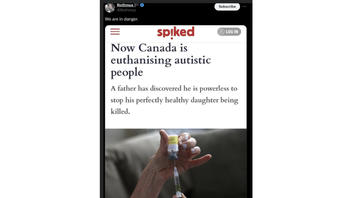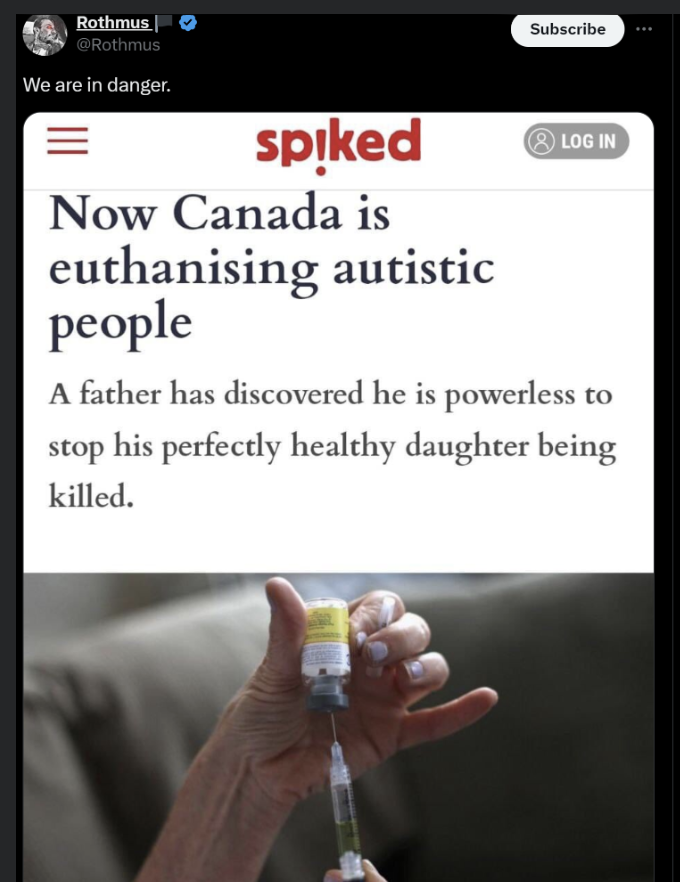
Is Canada killing autistic people without their consent? No, that's not true: The implication in a social media post, with a screenshot of a news article, that a man's perfectly healthy daughter who is on the autism spectrum could be killed with Canada's MAID program is false. MAID -- an acronym for "medical assistance in dying" -- does not kill perfectly healthy people. It allows consenting and informed people 18 or older, or younger if they have decision-making capacity, to elect, with the advice of multiple medical experts, to end their lives with government assistance. The criteria of who is eligible for the program does not include "neurocognitive and neurodevelopmental disorders, or other conditions that may affect cognitive abilities," the government states.
The claim appeared in a post (archived here) on X, formerly known as Twitter, on April 4, 2024. It opened:
We are in danger.
This is what the post looked like on X at the time of writing:
(Source: X screenshot taken on Wed Apr 10 17:43:03 2024 UTC)
The screenshot in the post is the headline from an article posted on Spiked Online (archived here) that details a case of a 27-year-old woman who was seeking to end her life through the MAID program. Her father was against the plan and asked a judge to stop her. The post implies that anyone's "perfectly healthy daughter" can be killed by the government with the MAID program, which is false.
The "daughter" is an adult and her parents had no legal rights to stop the MAID procedure, a judge ruled in the case, as the article states. The Canadian Broadcasting Corporation reported on the case here (archived here), noting that in the ruling, the judge wrote that the father, only identified as W.V, did not have the right to stop the decision of his daughter -- identified as M.V. -- to receive MAID:
Though I find that W.V. has raised serious issues, I conclude that M.V.'s autonomy and dignity interests outweigh competing considerations.
The father claimed she had no physical condition, the requirement for MAID, and had only been diagnosed as on the autism spectrum in 2016. According to the CBC article, the woman "did not file any court documents explaining how she came to qualify for MAID," but the judge ruled in her favor.
The Centers for Disease Control and Prevention describes autism on the website (archived here) this way:
Autism spectrum disorder (ASD) is a developmental disability caused by differences in the brain.
The headline of the article in the screenshot uses the word "euthanising," with the Canadian spelling. It's defined by the University of Missouri (archived here) this way:
Euthanasia is the practice of ending the life of a patient to limit the patient's suffering. The patient in question would typically be terminally ill or experiencing great pain and suffering.
The criteria for qualifying for MAID by the Government of Canada is stated on the website (archived here):
The law no longer requires a person's natural death to be reasonably foreseeable as an eligibility criterion for MAID.
As of March 17, 2021, persons who wish to receive MAID must meet the following eligibility criteria:
- be 18 years of age or older and have decision-making capacity
- be eligible for publicly funded health care services
- make a voluntary request that is not the result of external pressure
- give informed consent to receive MAID, meaning that the person has consented to receiving MAID after they have received all information needed to make this decision
- have a serious and incurable illness, disease or disability (excluding a mental illness until March 17, 2024)
- be in an advanced state of irreversible decline in capability
- have enduring and intolerable physical or psychological suffering that cannot be alleviated under conditions the person considers acceptable
The website stated that people who have only "neurocognitive and neurodevelopmental disorders" are not eligible for MAID, with that provision set in 2021 and subsequently extended to 2027:
Eligibility for persons suffering from mental illness
In 2021, it was determined that persons whose only medical condition is a mental illness, and who otherwise meet all eligibility criteria, would not be eligible for MAID for two years--until March 17, 2023. This includes medical conditions that are primarily treated within the domain of psychiatry, such as depression and personality disorders. It does not include neurocognitive and neurodevelopmental disorders, or other conditions that may affect cognitive abilities.
To note that individuals with mental illness as their "sole underlying medical condition" are not eligible for MAID until March 17, 2027, the government website stated:
Important: On February 29, 2024, legislation to extend the temporary exclusion of eligibility to receive MAID in circumstances where a person's sole underlying medical condition is a mental illness received royal assent and immediately came into effect. The eligibility date for persons suffering solely from a mental illness is now March 17, 2027.
Other Lead Stories fact checks about MAID in Canada can be found here.



















